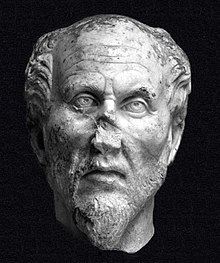Plotinos
| Plotinus | |
|---|---|

Plotinus
|
|
| Born |
c. 204/5 Lycopolis, Egypt, Roman Empire |
| Died | 270 (aged 64–65) Campania, Roman Empire |
| Era | Ancient philosophy |
| Region | Western Philosophy |
| School | Neoplatonism |
|
Main interests
|
Platonism, Metaphysics, Mysticism |
|
Notable ideas
|
Three principles: the First, the Second, and the Third; Emanationism; Henosis |
|
Influences
|
|
|
Influenced
|
|
Plotinus (/plɒˈtaɪnəs/; Greek: Πλωτῖνος; c. 204/5 – 270) was a major Greek-speaking philosopher of the ancient world. In his philosophy there are three principles: the One, the Intellect, and the . His teacher was Ammonius Saccas and he is of the Platonic tradition. Historians of the 19th century invented the term Neoplatonism and applied it to him and his philosophy which was influential in Late Antiquity. Much of the biographical information about Plotinus comes from Porphyry's preface to his edition of Plotinus' Enneads. His metaphysical writings have inspired centuries of Pagan, Islamic, Jewish, Christian, and Gnostic metaphysicians and mystics.
Porphyry reported that Plotinus was 66 years old when he died in 270, the second year of the reign of the emperor Claudius II, thus giving us the year of his teacher's birth as around 205. Eunapius reported that Plotinus was born in the Deltaic Lycopolis in Egypt, which has led to speculations that he may have been a native Egyptian of Roman,Greek, or Hellenized Egyptian descent.
...
Wikipedia
